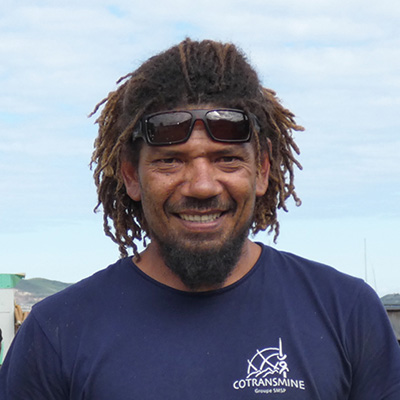Pierre-Yves worked at first as a casual shipping worker holding the position of on-board mechanic from 2009 and 2012. Later, he held a CFBS (Certificate of basic training in safety), a CIN (Certificate of Marine Initiation) as well as the mechanics certificate 250 KW, all qualifications delivered by IDC, from a personal incentive.
Since 2013, he became a Cotransmine permanent employee.
As an on-board mechanic, Pierre-Yves is responsible for the maintenance and repair of the company’s tug engines and equipment during and outside loading periods, in accordance with maritime regulations. He is also HSE Representative and must organize activities to ensure the safety of all tugboat crew.
 1. His various duties
1. His various duties
Attainment and driving the engines
One of his main responsibilities on boarding the tug is to ensure that the tug’s mechanics are in good functioning order. This begins with the ignition of the engines, through their starting on, by monitoring the beginning of operation until the end of the loading activity, then complete reports at the end of loading.
- Before the engines start, he has to check the oil and water levels; check the batteries; the engine (s) to make sure there is no abnormality.
- Before the start of the loading, Pierre-Yves must make sure that the engine has been sufficiently heated so that it is at the right temperature.
- During loading, several instantaneous tasks are performed. He must execute a round every 2 hours in the engine room. He keeps the machine record 3 times a day, registering the oil pressure, the water temperature and any other useful notes. When any anomaly is detected, he must notify tug Captain and his supervisor. He takes the initiative to make a repair if the problem he is facing can easily be solved. He must also immediately warn his team leader when the problem turns out to be a break to receive instructions. He performs the general maintenance of the ship (minor repairs, cleaning…).
- At the end of the loading, he communicates the hour-meters to the managers.
Engine monitoring and maintenance works outside loading period
Pierre-Yves must organize and plan tug maintenance operations. He is also in charge of maintaining the engines (draining, evacuating etc.) of the tugs in accordance with the manufacturer’s data and requirements. Depending on their specificities, he must carry out the development and adjustments of the tug engines. He proceeds to clean, repair and paint engines in the engine room. He installs new engines and related equipment. He performs periodic maintenance and fault diagnosis malfunctions while participating in daily mechanical and maintenance works. He must maintain and update the machine record and participate in the planed visits Maritime Affairs Department.
Tugboat equipment
Pierre-Yves controls the operation of the various equipment (windlasses, winches, pulleys, shaft line propellers, shaft line bearings, etc.) necessary for optimal tug activity and performs first level maintenance. In case of malfunction of these equipment, he may proceed to their repair, and informs his team leader when the change of the equipment is necessary.
Pierre-Yves uses, maintains, and performs the first level maintenance of the professional tools put at his disposal. He has to dispose all required tools to be transferred to the tugs or makes and undertakes repairs on the company’s 4 different operation sites.
2. His commitments as a HSE Representative
As an HSE representative he also needs to attest the availability of the safety equipment and in good working order on the tugs to ensure the safety of the crew.
He must ensure the application of procedures and standards in marine mechanics and carry out its activity in compliance with the safety, hygiene and environmental protection rules encouraging the PPE wearing as well as their storing and the tidiness of the working area.
He also has to carry out other related duties related to the mechanic’s activity.
Pierre-Yves comes from Saint-Louis Tribe in the Belep Islands at the end of the North of New Caledonia. “It is true that I work in a tidy and small space with smells of gasoline, diesel or solvent. But I like my job as a mechanic. I have to continually meet the challenges. To be dynamic, to stay clearheaded and be responsive in case of emergency. And I like to live in the sea but I like the sea. I do not see myself as a mechanic on a road.”
